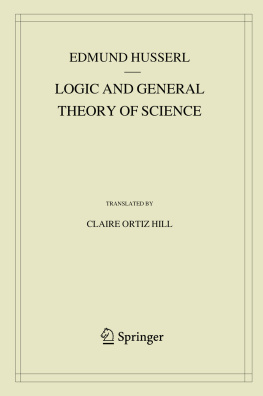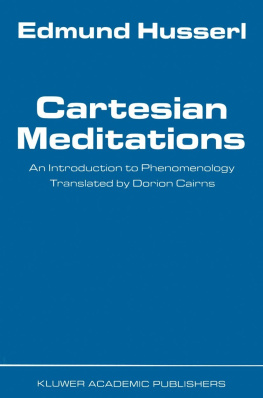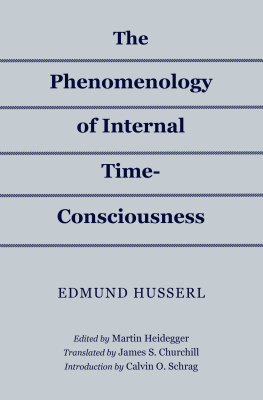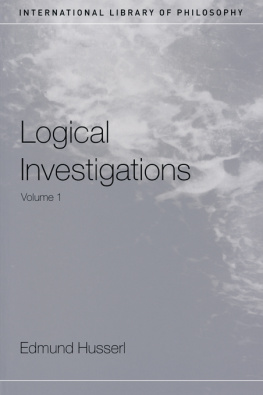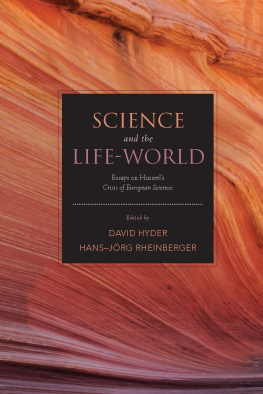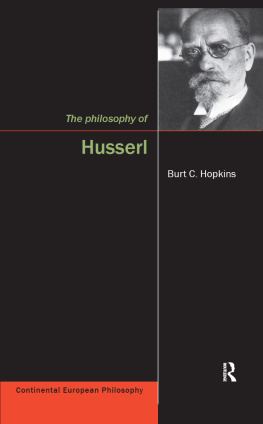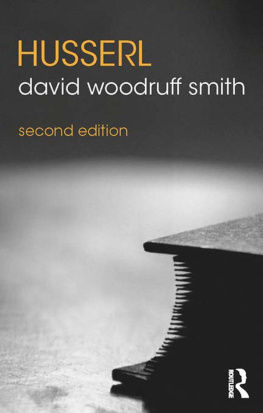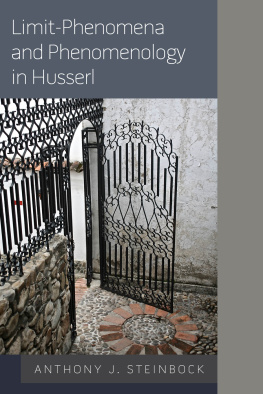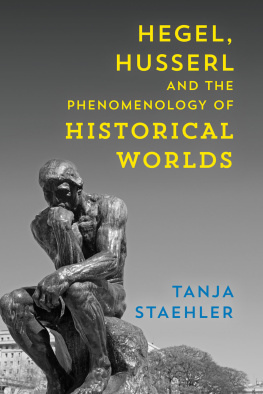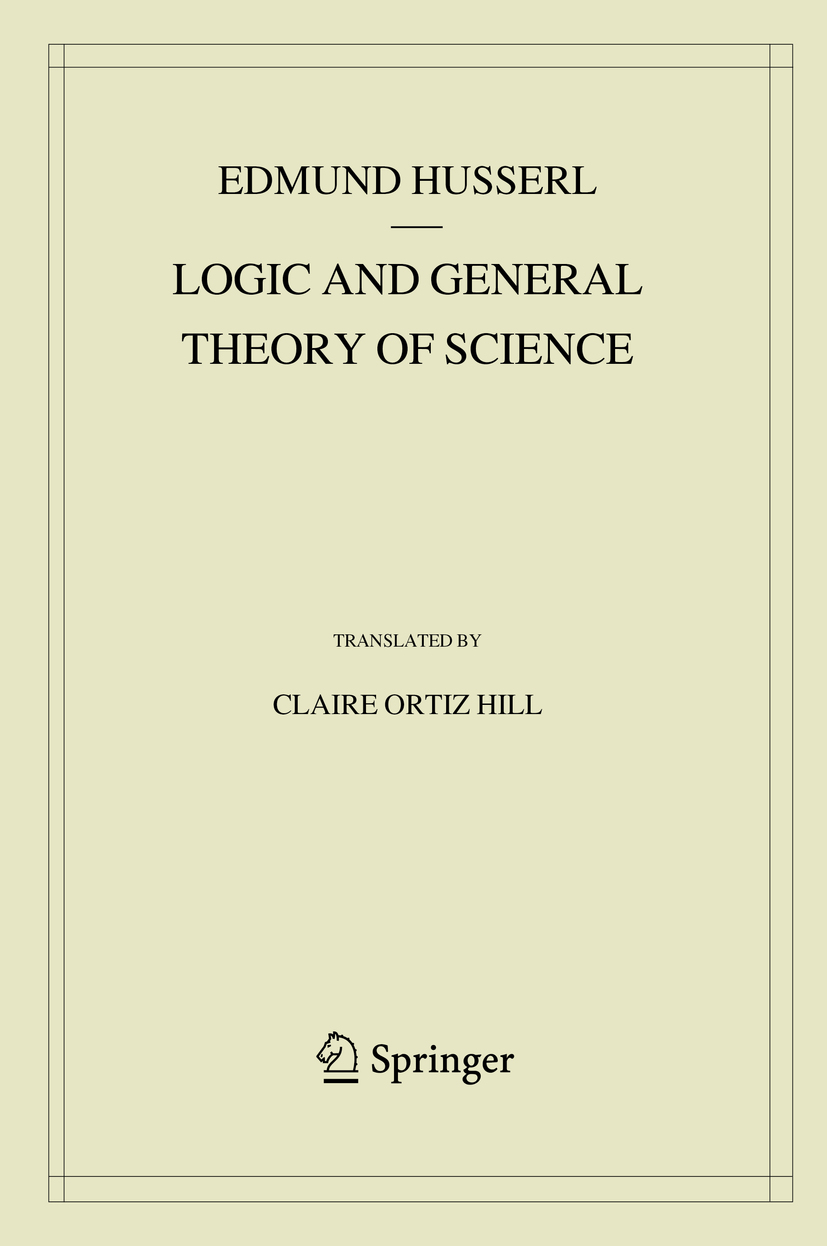Edmund Husserl
Dordrecht, The Netherlands
Translated by Claire Ortiz Hill
Husserliana: Edmund Husserl Collected Works
ISBN 978-3-030-14528-6 e-ISBN 978-3-030-14529-3
https://doi.org/10.1007/978-3-030-14529-3
Springer Nature Switzerland AG 2019
This work is subject to copyright. All rights are reserved by the Publisher, whether the whole or part of the material is concerned, specifically the rights of translation, reprinting, reuse of illustrations, recitation, broadcasting, reproduction on microfilms or in any other physical way, and transmission or information storage and retrieval, electronic adaptation, computer software, or by similar or dissimilar methodology now known or hereafter developed.
The use of general descriptive names, registered names, trademarks, service marks, etc. in this publication does not imply, even in the absence of a specific statement, that such names are exempt from the relevant protective laws and regulations and therefore free for general use.
The publisher, the authors, and the editors are safe to assume that the advice and information in this book are believed to be true and accurate at the date of publication. Neither the publisher nor the authors or the editors give a warranty, express or implied, with respect to the material contained herein or for any errors or omissions that may have been made. The publisher remains neutral with regard to jurisdictional claims in published maps and institutional affiliations.
This Springer imprint is published by the registered company Springer Nature Switzerland AG.
The registered company address is: Gewerbestrasse 11, 6330 Cham, Switzerland
TRANSLATORS INTRODUCTION
Logic and General Theory of Science is the translation of Edmund Husserls Logik und Allgemeine Wissenschaftstheorie edited by Ursula Panzer under the auspices of the Husserl Archives in Cologne and published for the first time in 1996 as volume XXX of the Husserliana series. The main text of the volume is the final version of lecture courses on the philosophy of logic and science given by Husserl at the universities of Gttingen and Freiburg between 1910 and 1918. The course was initially entitled Logik als Theorie der Erkenntnis (Logic as Theory of Knowledge) and was taught in Gttingen for the first time during the Winter semester of 1910/11. According to Panzers introduction (p. XIX), looking back, Husserl characterized it as the final version of his Gttingen lectures on formal logic. He would teach it a second and third time during the Winter semesters of 1912/13 and 1914/15 under the title Logik und Einleitung in die Wissenschaftstlehre (Logic and Introduction to the Theory of Science) and a fourth time at Freiburg during the Winter semester of 1917/18 under the present title.
Panzer explains that these lectures were considerably reworked over the years, a fact considered to be of particular significance because those changes were made during a decisive period in the evolution of Husserls thought. She notes that Husserl wrote to Georg Misch on November 16, 1930, that, by the time his Ideas was published in 1913, he had already lost all the interest that formal logic and all real ( reale ) ontology had held for him in the face of a systematic grounding of a theory of transcendental subjectivity.
Prepared for oral delivery in the classroom, these lectures are refreshingly lively and spontaneous, clearer, more explicit, and readable than the books Husserl published during his lifetime. Appendices II and III convey the enthusiasm for logic and philosophy of science that he was intent upon injecting into his students by means of them. There he explains that through his lectures, he was seeking to provide something entirely different from what could be learned from books, because lectures do not in general exist for the purpose of replacing books or to be spoken books or excerpts from books. He warned students that the usual expositions of logic are dangerous for beginners, because they only too easily deaden their sense of genuine scientificity and cover up the difficulties from them, like chasms covered over with greenery. It was his desire instead to introduce them to the inmost essence of work in logic and critique of knowledge, to the nature of their problems and methods, and prepare them to be able to derive benefit and excitement from reading important writings in the field, something which is achieved by laying bare the essential meaning of centuries of efforts as they relate to the state of things at the time and its insights, by imparting an understanding of the problems, goals, methods, and a sense of the deeper meaning of the theoretical efforts in which the greatness, grandeur, and force of philosophical science lies, by teaching them to sense the inmost spirit of the intentions of logic and theory of knowledge and to feel profoundly concerned by the fact that the problems to be surmounted were of grave import for anyone interested in ultimate truth and philosophy.
The only justified task of the teacher, he declares, is to train beginners to philosophize. If philosophy is the word for the highest aims of knowledge and the sciences directly oriented toward them, he suggests, then the discipline we want to devote ourselves to is in fact first philosophy, because it is a matter of investigations that must precede and be attended to before further philosophizing can be contemplated in earnest. He defines his mission as being one of raising students above the nave standpoint and showing them the way to the mysterious solitudes in which one day the sphinx of knowledge must unveil its riddle. He says that he could also call it the way to the mothers of knowledge, to the essence-principles of knowledge in terms of its ultimate origins. Regarding these mothers, he says that he loves to recall Mephistopheles words in Goethes Faust : Enthroned sublime in solitude are goddesses. Around them is no place, still less any time. Mephistopheles, he reminds students, had described that solitude in a horrifying manner and tried to deter aspirants from venturing into those untrodden, and not to be trodden, places where they would see nothing in interminably empty farness, not hear their own footsteps, not find anything firm where they rested. Husserl, however, counseled his students to be unafraid and to respond with Faust, Just keep on, we want to fathom it. In your nothing, I hope to find the universe.
These lectures find Husserl enthusing that even though formal logic belongs to one of the oldest sciences of mankind, everything in it is evolving; the ossified concepts and formulas of the tradition are coming alive again, moving, evolving (19b). In Alte und Neue Logik , taught in 1908/09, he speaks of what a delight it is to be alive and to share in striving after the greatness coming into being in those days, which are not, as often said, times of decadence, but rather the beginning of a truly great philosophical era in which age-old goals will finally be met at the cost of truly heroic strain from toil and new, higher, goals will everywhere be held out. We in modern philosophy, he said, are no less than visionaries (

